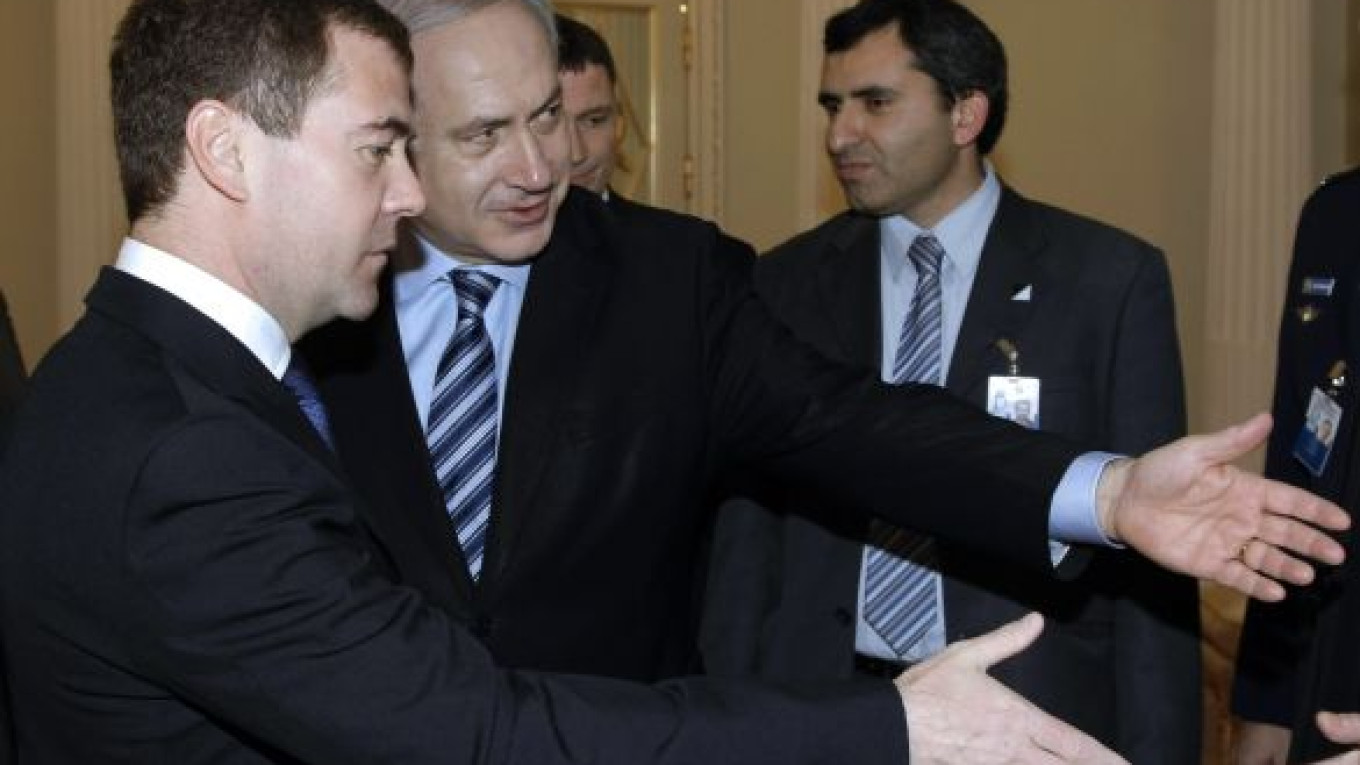Israeli Prime Minister Benjamin Netanyahu on Monday renewed his call for "crippling sanctions" against Iran over its nuclear program and praised Russia for "understanding" the need to prevent the Islamic republic from developing nuclear capabilities.
Netanyahu and President Dmitry Medvedev met in the Kremlin to discuss possible sanctions, which Netanyahu said must focus on fuel imports and exports.
"I can say that Russia definitely understands there is a need to prevent Iran from obtaining nuclear weapons and it understands that steps must be taken," Netanyahu said, The Associated Press reported. "I trust what I heard from the president of Russia, whose decisions are driven by concerns of regional stability."
Medvedev had not publicly commented on his meeting with Netanyahu as of Monday evening.
Russia and China, who both have veto power on the UN Security Council, have been reluctant to support U.S.-backed sanctions against Iran and have acted to water them down.
Senior Russian officials have repeatedly spoken of the need to prevent Iran from becoming a nuclear power, which they say would spark an arms race in the region and eventually ruin nonproliferation efforts. The officials say, however, that there is no direct evidence that Iran is pursuing an atomic bomb.
Late last year, however, Medvedev said Russia might support tougher sanctions against Iran over Tehran's refusal to cooperate with international efforts to halt Iran's work on uranium enrichment, which can lead to the acquisition of weapons-grade fissile material.
Iranian President Mahmoud Ahmadinejad, who has called for the destruction of Israel, announced last week that Tehran had begun enriching its uranium to the 20 percent level, saying it would be used in medical equipment. He added that Iran has the technical capacity to enrich uranium to 80 percent. Weapons-grade uranium is at the 90 percent level or higher.
The secretary of the Russia's influential Security Council, Nikolai Patrushev, said it was "doubtful" that Iran would enrich its uranium to 20 percent for peaceful purposes and that Russia might agree to tougher sanctions.
Meanwhile, in a move highlighting the ambiguity of Moscow's policy toward Iran, Patrushev's deputy, Vladimir Nazarov, told reporters Sunday that Russia "must implement" a 2005 contract with Iran to supply powerful S-300 air defense systems.
Deployment of the S-300, which can engage and destroy not only aircraft but short- and medium-range cruise and ballistic missiles as well, would dramatically increase the cost of a possible pre-emptive Israeli strike against Iranian nuclear facilities.
It would also make it nearly impossible for Israel to carry out such strikes without the support of the United States, military analysts say.
Washington and Tel-Aviv have called on Moscow not to deliver the S-300s to Iran, and the deal has been suspended. Netanyahu reportedly flew to Moscow for a brief secret visit in September to convince Medvedev not to sell the systems to Tehran.
Netanyahu on Monday would not say whether a possible Israeli military offensive was discussed in his meeting with Medvedev, though he said an international consensus is forming on the increasing threat posed by Iran, the AP reported.
"There is a growing understanding about the Iranian threat and the need to stop them from developing a nuclear weapon," he told the AP. "The gaps between the leading countries is getting smaller and smaller."
Iran's ambassador to Russia, Seyyed Mahmoud Reza, told Ekho Moskvy radio Monday that Russia should fulfill the contract for the S-300s and that Russian support for sanctions would seriously impact bilateral relations.
U.S. Secretary of State Hillary Clinton said Monday that Washington is now focused on gaining international support for sanctions "that will be particularly aimed at those enterprises controlled by the Revolutionary Guard, which we believe is in effect supplanting the government of Iran," the AP reported.
The Revolutionary Guard is paramilitary structure whose leaders are prominently represented in the Iranian ruling elite.
Sanctions being pushed by the United States and its allies include the freezing of assets linked to the Revolutionary Guard, travel bans for certain Iranian officials, cutting gas imports to Tehran, and an arms trade embargo.
A Message from The Moscow Times:
Dear readers,
We are facing unprecedented challenges. Russia's Prosecutor General's Office has designated The Moscow Times as an "undesirable" organization, criminalizing our work and putting our staff at risk of prosecution. This follows our earlier unjust labeling as a "foreign agent."
These actions are direct attempts to silence independent journalism in Russia. The authorities claim our work "discredits the decisions of the Russian leadership." We see things differently: we strive to provide accurate, unbiased reporting on Russia.
We, the journalists of The Moscow Times, refuse to be silenced. But to continue our work, we need your help.
Your support, no matter how small, makes a world of difference. If you can, please support us monthly starting from just $2. It's quick to set up, and every contribution makes a significant impact.
By supporting The Moscow Times, you're defending open, independent journalism in the face of repression. Thank you for standing with us.
Remind me later.


